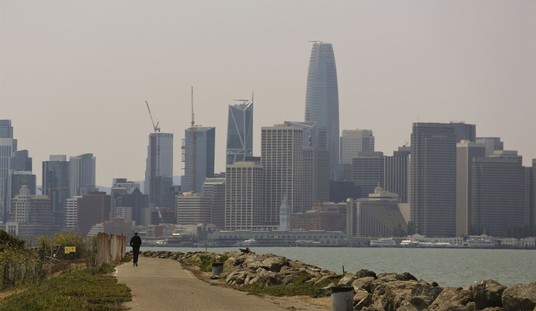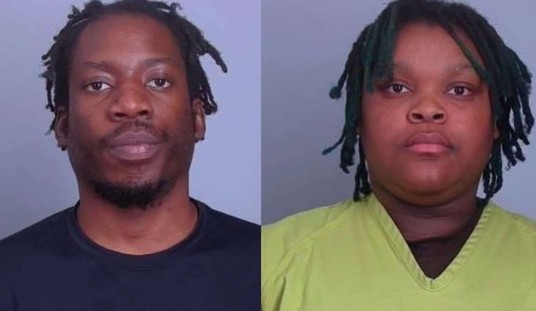During the argument over gay marriage, one of the many arguments put forth against the policy change was that redefining marriage would inevitably lead to further, less desirable changes in short order.
The idea was simple and, for many, compelling:
The status quo ante was simple: marriage is a state-recognized bond between one man and one woman, and it stands apart from other contractual relationships because families form the fundamental unit of society. Generally speaking, married couples procreate and provide the most suitable environment for raising children. Other social bonds may also be valuable and worthy of some form of recognition (civil unions, for instance), but marriage is fundamentally about creating the social unit of a family.
Proponents of gay marriage, with variations, made the argument that "Love is love," and marriage was about love. Whether that love was between a man and a woman or some other combination didn't matter, and gay couples deserve the same recognition from the state as heterosexuals.
The key to the argument, though, is that allowing gay marriage did nothing to fundamentally alter the nature of the family itself. Andrew Sullivan went so far as to argue that gay marriage would strengthen the institution of marriage, and his argument wasn't silly.
It was wrong, though. Changing the definition of marriage that had stood in Western society for millennia has led to a rapid deterioration of the social norms that form the foundation of our social arrangements. In less than a decade we have moved from "Love is love" to "polyamory is just as valid as monogamy and should be supported by the state."
I am not going to get into an argument about polyamory as a human institution. That isn't my point. Rather, I want to address an issue that I am more competent to speak on: the slippery slope is real.
One of the strongest arguments in my view against gay marriage was that the issue wasn't gay marriage at all; it was about whether we were willing to overturn the foundation of our social order or wanted to preserve it.
Opponents of gay marriage often argue that once you redefine marriage, the term becomes so malleable that it will become essentially meaningless. If "Love is love," then why not other social arrangements like polyamory?
We were accused of using the "slippery slope" fallacy; the issue was gay marriage, not polyamory, so we should quit frightening people with what-if arguments.
But the slippery slope is very real, and we can see this right before our eyes:
Polyamorous relationships are being normalized, and now courts are changing the definition of "parent" to include more than the mother and the father.
This was inevitable because the range of things people "want" is nearly infinite, just as the number of genders turns out to be infinite. There is no limit if the only limit is the human imagination, and once we start redefining things, there is no place to stop.
A recent court case in New York City, West 49th St., LLC v. O'Neill, has set a new precedent, and I couldn’t be more thrilled — both as a relationship and sex therapist and as a polyamorous bisexual person. In her ruling, NYC Civil Court Judge Karen May Bacdayan concluded that polyamorous relationships — in this context, consensual relationships involving three or more partners — are entitled to the same legal protections given to two-person relationships.
This ruling comes on the heels of a couple other victories. In June 2020, Somerville, Massachusetts passed an ordinance that allows groups of three or more people who “consider themselves to be a family” to be recognized as domestic partners — and then the neighboring town of Cambridge passed a broader ordinance not only recognizing multi-partner relationships, but also the right of more than two people to be a child’s legal parents.
Whatever you think of polyamory--I am not a fan, but haven't studied it deeply so I admit that I could be wrong--I do know that our fears that redefining marriage would lead to a cascade of redefinitions were dismissed as catastrophizing. Gay marriage had nothing to do with polyamory; these are two separate issues.
Except they aren't. It's not that gay marriage leads to polyamory--the two phenomena are different in kind. Rather, the common thread is the willingness to upend millennia of tradition and understanding based solely on the desires of individuals to change them.
Now not all changes are bad. Slavery as an institution was both embedded in human society, including Western culture and eliminating it was a hugely disruptive thing. But it also was necessary because slavery is fundamentally unjust.
The injustices that denying gay marriages caused were easily solvable without redefining the family, though. Simple contracts establishing rights for gays in relationships could have been drafted, and even flexibly so. Each couple could assign rights differently if they liked.
But the special status of the nuclear family could and should have been preserved because it is not just a simple contractual relationship, and treating it as such has done terrible harm.
As I have said before, the original harm to marriage can't be traced to legalizing gay marriage. It was the introduction of no-fault divorce that started this process, and gay marriage was simply a large step along a path we had already taken years earlier.
But the trend has accelerated and metastasized. Every fundamental institution in our culture is collapsing, and alphabet ideology is all about breaking down society and replacing it with something fundamentally sicker.
Children have become commodities that people can literally buy. They are playthings for people to express themselves and are even dressed up as dolls and displayed as sex objects.
Gay marriage, as I said, is not the cause of this. Its legalization, though, was a big step along the way to this brave new future. It's no coincidence that the massive explosion in alphabet ideology rapidly followed Obergefell v. Hodges. I don't blame gay people at all; I blame the people who redefined marriage as just one more step on the path to self-actualization.
Empowering people to live as they choose is a wonderful part of living in a liberal society. But liberal societies depend on having a basic social order that perpetuates the values we all hold dear. As we have seen, with the decline of the family a raft of social ills and an explosion in mental illness, antisocial behavior, and efforts to clamp down on intellectual freedoms while emphasizing appetitive freedoms is leading us to a very dark place.
A society that divorces freedom from rationality becomes Sodom. That is where we are headed.








